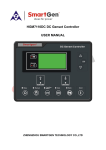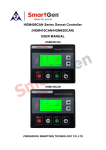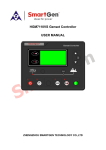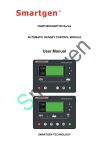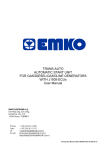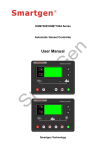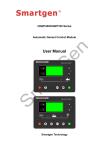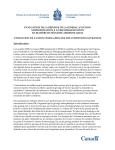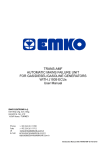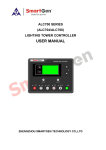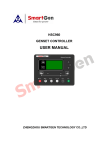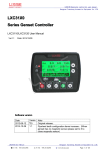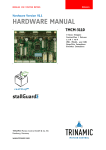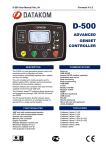Download HGM7110DC DC Genset Controller USER MANUAL
Transcript
HGM7110DC DC Genset Controller USER MANUAL ZHENGZHOU SMARTGEN TECHNOLOGY CO.,LTD This manual is suitable for HGM7110DC controller only. Clarification of notation used within this publication. SIGN Note INSTRUCTION Highlights an essential element of a procedure to ensure correctness. Caution! Indicates a procedure or practice, which, if not strictly observed, could result in damage or destruction of equipment. Warning! Indicates error operation may cause death, serious injury and significant property damage. Contents 1 OVERVIEW ....................................................................................................................... 6 2 PERFORMANCE AND CHARACTERISTICS ................................................................... 7 3 SPECIFICATION ............................................................................................................. 10 4 OPERATION ..................................................................................................................... 11 4.1. PUSHBUTTONS .................................................................................................. 11 4.2. LCD DISPLAY ..................................................................................................... 12 4.2.1. MAIN DISPLAY ............................................................................................. 12 4.2.2. PARAMETERS SETTING MENU ................................................................. 12 5 6 4.3. AUTO START/STOP OPERATION ..................................................................... 15 4.4. MANUAL START/STOP OPERATION ................................................................ 17 SWITCH CONTROL PROCEDURES ............................................................................. 18 5.1 ACCUMULATOR/GENSET PRIORITY SYSTEM: .............................................. 18 5.2 TWO ACCUMULATOR PRIORITY SYSTEM ..................................................... 20 PROTECTIONS ............................................................................................................... 22 6.1 WARNING ALARMS ........................................................................................... 22 6.2 SHUTDOWN ALARM.......................................................................................... 24 6.3 TRIP AND STOP ALARM.................................................................................... 26 6.4 TRIP ALARM ....................................................................................................... 27 7 WIRING CONNECTION .................................................................................................. 28 8 SCOPES AND DEFINITIONS OF PROGRAMMABLE PARAMETERS .......................... 31 8.1 CONTENTS AND SCOPES OF PARAMETERS ................................................ 31 8.2 PROGRAMMABLE OUTPUT PORTS ................................................................ 42 8.2.1 9 DEFINED COMBINATION OUTPUT ............................................................ 45 8.3 PROGRAMMABLE INPUT PORTS (ALL ACTIVE WHEN CONNECT TO GRAND (B-)) 47 8.4 SELECTION OF SENSORS ............................................................................... 50 8.5 CONDITIONS OF CRANK DINSCONNECT SELECTION ................................. 51 SENSORS SETTING ...................................................................................................... 52 10 COMMISSIONING .................................................................................................... 53 11 TYPICAL APPLICATION ........................................................................................... 54 12 INSTALLATION ......................................................................................................... 55 13 GSM SHORT MESSAGE ALARM AND REMOTE CONTROL ................................. 57 14 13.1 GSM SHORT MESSAGE ALARM ...................................................................... 57 13.2 GSM SHORT MESSAGE REMOTE CONTROL ................................................ 58 CONNECTIONS OF CONTROLLER WITH J1939 ENGINE .................................... 60 14.1 CUMMINS ISB/ISBE ........................................................................................... 60 14.2 14.3 CUMMINS QSL9................................................................................................. 60 CUMMINS QSM11 (import) ................................................................................ 61 14.4 CUMMINS QSX15-CM570 ................................................................................. 61 14.5 CUMMINS GCS-MODBUS ................................................................................. 62 14.6 DETROIT DIESEL DDEC III / IV ......................................................................... 62 14.7 DEUTZ EMR2 ..................................................................................................... 63 14.8 JOHN DEERE ..................................................................................................... 63 14.9 MTU MDEC ......................................................................................................... 64 14.10 PERKINS ............................................................................................................ 64 14.11 SCANIA ............................................................................................................... 65 14.12 VOLVO EDC3 ..................................................................................................... 65 14.13 VOLVO EDC4 ..................................................................................................... 66 14.14 VOLVO-EMS2 ..................................................................................................... 66 14.15 BOSCH ............................................................................................................... 67 15 FAULT FINDING ........................................................................................................ 68 1 OVERVIEW HGM7110DC genset controller is used for genset automation and monitor control system of single unit to achieve automatic start/stop, data measurement, alarm protection and ―three remote‖ (remote control, remote measuring and remote communication). The controller adopts large liquid crystal display (LCD) and selectable Chinese, English or other languages interface with easy and reliable operation. HGM7110DC controller adopts 32 bits micro-processor technology with precision parameters measuring, fixed value adjustment, time setting and threshold adjusting and etc. The majority of parameters can be set using front panel and all the parameters can be set using PC (via USB port) and can be adjusted and monitored with the help of RS485 ports. It can be widely used in all types of automatic genset control system with compact structure, advanced circuits, simple connections and high reliability. 2 PERFORMANCE AND CHARACTERISTICS HGM7110DC: Control the genset to start/stop by detecting the accumulator voltage or charger current. With ARM-based 32-bit SCM, highly integrated hardware, new reliability level; 132x64 LCD with backlight, multilingual interface (including English, Chinese or other languages) which can be chosen at the site, making commissioning convenient for factory personnel; Improved LCD wear-resistance and scratch resistance due to hard screen acrylic; Silicon rubber panel and pushbuttons for better operation in high/low temperature environment; RS485 communication port enables remote control, remote measuring, remote communication via ModBus protocol. Equipped with SMS (Short Message Service) function. When genset is alarming, controller can send short messages via SMS automatically to max. 5 telephone numbers. Besides, generator status can be controlled and checked using SMS. Equipped with CANBUS port and can communicate with J1939 genset. Not only can you monitoring frequently-used data (such as water temperature, oil pressure, speed, fuel consumption and so on) of ECU machine, but also control starting up, shutdown , raising speed and speed droop via CANBUS port. Suitable for Accumulator Priority System, Generator Priority System, Or Double Accumulator System; Accumulator Priority System:The accumulator supplies the power for load continuously. In Auto mode, the genset will start automatically to charger the accumulator if the accumulator voltage has fallen below the ―Charge Start Voltage‖. Generator Priority System: The generator supplies the power for load continuously. If there is shutdown alarm occurs by either engine or generator, the accumulator will supply the power for load. In Auto mode, the genset will charge the accumulator if the accumulator voltage has fallen below the ―Charge Start Voltage‖; When the accumulator voltage has fallen below the ―Nominal Voltage‖, in addition, the generator abnormal condition occurs, Shutdown alarm will be initiated Double Accumulator System: Firstly, the accumulator 1# supplies the power for load; if the accumulator 1# satisfies the charger requirement, then it will charged by the genset and the accumulator 2# supplies the power for load. Collects and shows parameters: Accumulator Accumulator Voltage (after the compensation) Accumulator Temperature Accumulator Charge Current Accumulator Discharge Current Load Current Generator Current Accumulator over voltage, under voltage protection functions; 3 fixed analog sensors (temperature, oil pressure and liquid level); 2 configurable sensors can be set as sensor of temperature, oil pressure or fuel level; Precision measure and display parameters about Engine, Temp. (WT) °C/°F both be displayed Oil pressure (OP) kPa/Psi/Bar all be displayed Fuel level (FL) %(unit) Speed (SPD) r/min (unit) Voltage of Battery (VB) Voltage of Charger (VD) V (unit) V (unit) Hour count (HC) can accumulate to max. 65535 hours. Start times can accumulate to max. 65535 times. Protection: automatic start/stop of the genset, perfect fault indication and protection function; All output ports are relay-out; Parameter setting: parameters can be modified and stored in internal FLASH memory and cannot be lost even in case of power outage; most of them can be adjusted using front panel of the controller and all of them can be modified using PC via USB or RS485 ports. More kinds of curves of temperature, oil pressure, fuel level can be used directly and users can define the sensor curves by themselves; Multiple crank disconnect conditions (speed sensor, oil pressure) are optional; Widely power supply range DC(8~35)V, suitable to different starting battery voltage environment; Event log, real-time clock and Scheduled start & stop function (can be set as start genset once a day/week/month); Can be used as an indicating instrument (indicate and alarm are enable only, relay is inhibited ); With maintenance function. Actions (warning, shutdown) can be set when maintenance time out; All parameters used digital adjustment, instead of conventional analog modulation with normal potentiometer, more reliability and stability; Waterproof security level IP55 due to rubber seal installed between the controller enclosure and panel fascia; Metal fixing clips enable perfect in high temperature environment; Modular design, self-extinguishing ABS plastic enclosure, pluggable connection terminals and embedded installation way; compact structure with easy mounting. 3 SPECIFICATION Parameter Working Voltage Overall Consumption Speed Sensor Voltage Speed Sensor Frequency Start Relay Output Fuel Relay Output Configurable Relay Output 1 Configurable Relay Output 2 Configurable Relay Output 3 Configurable Relay Output 4 Configurable Relay Output 5 Configurable Relay Output 6 Case Dimensions Panel Cutout Working Conditions Storage Conditions Protection Level Insulation Intensity Weight Details DC8. 0V to 35. 0V, continuous power supply <3W (Standby mode: ≤2W) 1. 0 V to 24 V (RMS) Maximum 10,000 Hz 16A DC28V power supply output 16A DC28V power supply output 7A DC28V power supply output 7A AC250V passive output 16A AC250V passive output 16A AC250V passive output 7A DC28V power supply output 7A DC28V power supply output 197mm x 152mm x 47mm 186mm x 141mm Temperature: (-25~+70)°C Humidity: (20~93)%RH Temperature:(-25~+70)°C IP55 Gasket Apply AC2.2kV voltage between high voltage terminal and low voltage terminal; The leakage current is not more than 3mA within 1min. 0.75kg 4 OPERATION 4.1. PUSHBUTTONS Stop Stop running generator in Auto/Manual mode; Lamp test (press at least 3 seconds); Reset alarm in stop mode; During stopping process, press this button again to stop generator immediately. Start Start genset in Manual mode. Manual Mode Press this key and controller enters in Manual mode. Auto Mode Press this key and controller enters in Auto mode. Close/Open Can control generator to switch on or off in Manual mode. Mute/Reset Alarm Alarming sound off; If there is trip alarm, pressing the button at least 3 seconds can reset this alarm. Raise Speed Control the genset accelerate in Manual mode. Drop Speed Control the genset decelerate in Manual mode. Menu/Confirm Up/Increase Down/Decrea se NOTE: Pressing 1) Enter into Menu interface; 2) Shift cursor and confirm the set information. 1) Screen scroll; 2) Up cursor and increase value in setting menu. 1) Screen scroll; 2) Down cursor and decrease value in setting menu. to enter into Menu interface; select ―Parameters‖ and input correct passwords allows the users to set parameters. NOTE: and Pressing and simultaneously will increase LCD contrast; Pressing simultaneously will decrease LCD contrast; When controller is powered on after outage, LCD contrast will return factory default. WARNING: Default password is 00318, user can change it in case of others change the advanced parameters setting. Please clearly remember the password after changing. If you forget it, please contact Smartgen services and send all information in the controller page of ―ABOUT‖ to us. 4.2. LCD DISPLAY 4.2.1. MAIN DISPLAY Main screen show pages; use to scroll the screen. ★Main Screen, including as below, Genset status, ATS status, Accumulator voltage, Accumulator temperature, Generator Current, Accumulator Charge Current, Accumulator Discharge Current, ,Load current, Engine speed ★Accumulator Charging Curve Screen, including as below, Charge Start Voltage,Const Charge Voltage,Charge Stop Voltage,Accumulator Voltage, Accumulator Current,Charging Status ★Engine 1#, including as below, Engine Speed, GOV/AVR, Engine Temperature, Engine Oil Pressure ★Engine 1#, including as below, Liquid (Fuel) Level, Controller Voltage, Charger Voltage, Configure Analog 1 NOTE: If connected with J1939 engine via CANBUS port, this page also includes: coolant pressure, coolant level, fuel temperature, oil pressure, inlet temperature, exhaust temperature, turbo pressure, total fuel consumption and so on.(different engine with different parameters) ★Acc. Information, including as below, Total Running Time, Total Start Times, Maintenance Due ★Alarm: Display all of alarm information. NOTE: For ECU alarms and shutdown alarms, if the alarm information is displayed, check engine according to it, otherwise, please check the manual of generator according to SPN alarm code. ★Press can enter into menu interface to viewing the following items: event log; input/output ports status; Issue time of software and hardware version; Time and Date ★Event Log, including as below, Records all start/stop events (shutdown alarm, trip and stop alarm, manual /auto start or stop) and the real time when alarm occurs. 4.2.2. PARAMETERS SETTING MENU Parameters setting including as following, ★Charge Settings ★Timer settings ★Engine settings ★Load settings ★ATS settings ★Analog sensor settings ★Input port settings ★Output port settings ★Module settings ★Scheduling and maintenance settings ★GSM settings Example: Advanced Parameters > Charge > Timer > Engine > Load Form 1: Use to scroll settings, 2), to enter settings (form to exit settings menu. Charge > Return > 1# Bat Rated Voltage >2# Bat Rated Voltage > 1# Battery Num Form 2: Charge > Charge Stop Current > Float Charge Volt > Nominal Voltage > Charge OC Form 3: Charge OC Sel:Disable Set Value: 00110% Return Value: 00108% Delay: 00005 Form 4: to scroll settings (form 3); select ―return‖ and Use press to return to previous menu (form 1), or press to return to previous menu (form 1). Use to scroll settings, 4), Use to confirm settings (form to return to previous menu. (form 1) to enter settings (form 5), to return to previous menu. (form 3) to scroll settings, Form 5: Charge OC Sel:Disable Use Set Value: 00110% Return Value: 00108% (form 7), Delay: 00005 Form 6: Charge OC Sel:Disable Use Set Value: 00110% Return Value: 00108% (form 7), Delay: 00005 Charge OC Sel:Enable Set Value: 00110% Return Value: 00108% Delay: 00005 Form 7: Charge OC Sel:Disable Set Value: 00110% Return Value:00108% Delay: 00005 Form 8: NOTE: Long time pressing Use to scroll settings (form 6), to enter settings to exit settings menu. (form 4) to scroll settings (form 5), to enter settings to exit settings menu. (form 4) to scroll settings (form 5), to enter settings, to exit settings menu. (form 4) Use to scroll settings, to enter settings (form 4), to exit settings menu. (form 4) can exit setting directly during setting. 4.3. AUTO START/STOP OPERATION Auto mode is selected by pressing the button; a LED besides the button will illuminate to confirm the operation. Starting Sequence: 1. When the accumulator voltage has fallen below the ―Charge Start Voltage‖ or when ―Remote Start (with load)‖ is active, ―Start Delay‖ timer is initiated. ―Start Delay‖ countdown will be displayed on LCD display; 2. When start delay is over, preheat relay energizes (if configured), ―preheat delay XXs‖ information will be displayed on LCD display; 3. After the above delay, the Fuel Relay (if configured) is energized, and then one second later, the Start Relay is engaged. The engine is cranked for a pre-set time. If the engine fails to fire during this cranking attempt then the fuel relay and start relay are disengaged for the pre-set rest period; ―crank rest time‖ begins and wait for the next crank attempt. 4. Should this start sequence continue beyond the set number of attempts, the start sequence will be terminated, and Fail to Start fault will be displayed on LCD display. 5. In case of successful crank attempt, the ―Safety On‖ timer is activated, allowing Low Oil Pressure, High Temperature, Under speed and Charge Alternator Failure inputs to stabilise without triggering the fault. As soon as this delay is over, ―Waiting For Load‖ delay is initiated. 6. If the on-load requirements have been reached, then the generator close relay will be energized and the constant-current charge status is settled. The generator will regulate GOV/AVR voltage automatically according to the charging current; If the GOV/AVR voltage has reached its maximum value while the charging current is lower than the ―Rated Charge Current‖, Charge Fault alarm will be initiated. NOTE: Charge Stop Mode:Charge Current + Volt. The accumulator charges the genset with the preset rated charging current (charge type: constant current). When the accumulator voltage has exceeded the ―constant voltage value‖, enter into the ―Constant Voltage Charge‖ status. During the ―Constant Voltage Charge‖ status, the accumulator charges the genset with its minimum charging current as soon as the minimum value is reached. After the accumulator voltage has reached the ―Charge Stop Voltage‖, the charging is finished and the genset is enter into ―Stop Mode‖. Charge Stop Mode:Charge Delay. The accumulator charges the genset with the preset rated charging current (charge type: constant current). When the accumulator voltage has exceeded the ―constant voltage value‖, enter into the ―Constant Voltage Charge‖ status and this status will last for preset time. Automatic Stop Sequence, 1) When the genset is charged or when the ―Remote Start‖ signal is removed, the Stop Delay is initiated. Once this ―stop delay‖ has expired, the Generator Breaker will open and the ―Cooling Delay‖ is then initiated. 2) After the ―Cooling Delay‖, "Fail to Stop Delay" begins, fuel relay is de-energized, complete stop is detected automatically. 3) When generator is stop completely, ―After stop‖ delay will be initiated. Otherwise, fail to stop alarm is initiated and the corresponding alarm information is displayed on LCD display. (If generator is stop successfully after ―fail to stop‖ alarm has initiated, ―After stop‖ delay will be initiated and the alarm will be removed). 4) Generator is placed into its standby mode after its ―After stop‖ delay. 4.4. MANUAL START/STOP OPERATION 1 Manual mode is selected by pressing the illuminate to confirm the operation; Then press button; a LED besides the button will button to start the generator, it can automatically judge crank success and accelerate to high speed running. If high temperature, low oil pressure, over speed and abnormal voltage occur during genset running, controller can effectively protect genset to stop (detail procedures please refer to No.2~6 of Auto Start Sequence). If generator is normal, users can energize ―Gen Close Relay‖ manually via button or adjust engine speed manually via button in order to let the accumulator is charged. 2 Manual stop: pressing key can shut down the running genset. (detail procedures please refer to No.2~4 of Auto Stop Sequence) NOTE: Manual start/stop operations are used for Test only. 5 SWITCH CONTROL PROCEDURES 5.1 ACCUMULATOR/GENSET PRIORITY SYSTEM: Charging: Igen = Iacc + Iload; Non-charging:Igen = 0,Iacc = -Iload; Charging: Iacc = Igen - Iload; Non-charging:Iacc = -Iload; Charging: Iload = Igen - Iacc; Non-charging:Iacc = xxx,Iload = xxx,Igen = 0; Accumulator Priority System: In Auto mode, K2 and K3 are always close. When the accumulator voltage has fallen below the Charge Start Volt, the genset will be started according to the preset sequence. If the on-load requirements have been reached, K1 Close relay will activate to charge the accumulator. Genset Priority System: In Auto mode, K1 and K3 are always close. When the accumulator voltage has fallen below the Charge Start Volt, the genset will be started according to the preset sequence. If the on-load requirements have been reached, K2 Close relay will activate to charge the accumulator. If Genset failure occurs, K2 Close relay will activate and the Accumulator will take load. 5.2 TWO ACCUMULATOR PRIORITY SYSTEM 1# Acc Charging:Iacc1 = Igen; 1# Acc on-load:Iacc1 = -Iload; 2# Acc Charging:Iacc2 = Igen; 2# Acc on-load:Iacc2 = -Iload; 1. Accumulator Switching Mode: Gap 1# Accumulator take load (K4 is closed);When the 1# accumulator voltage has fallen below the Charge Start Volt, K4 open relay will active, after 10s delay, 2# Accumulator take load (K5 is closed). During the above transfer process, the load is disconnect; The genset will be started according to the preset sequence to charge the 1# Accumulator (K1 is closed). Same procedures as above when 2# Accumulator transfer to 1# Accumulator. 2. Two Accumulator Switching Mode: Continuous 1# Accumulator take load (K4 is closed);When the 1# accumulator voltage has fallen below the Charge Volt, 2# accumulator voltage will be recorded and the genset voltage detection begins; The genset will be started according to the preset sequence; When the genset voltage rise to 1# accumulator voltage, K2 close relay will active and genset takes load. After 1s delay, K4 open relay will active. Adjust the genset voltage to reach to 2# accumulator voltage, then 2# accumulator takes load (K5 is closed), K2 open relay active. After 1s delay, K1 close relay active to charge the 1# accumulator. Same procedures as above when 2# Accumulator transfer to 1# Accumulator. NOTE:All above switch actions can be implemented when the controller is in Auto mode. MANUAL TRANSFER PROCEDURES: Accumulator Priority: K2 and K3 are always close. Press button,if generator have taken load (K1 Close),will output unload signal (K1 Open);if taken no load (K1 Open),generator will output load signal (K1 Close); Generator Priority: K1 and K3 are always close. Press button,if Accumulator have taken load (K2 Close),will output unload signal (K2 Open);if taken no load (K2 Open),accumulator will output load signal (K2 Close); Two accumulators Priority: In Manual mode, only genset will be started and the ATS will not act. AUTO TRANSFER PROCEDURES: 1. If input port is configured as Close Generator Auxiliary ◆ If “Open breaker detect” is “SELECT Enable” Generator load is transferred into generator un-load or accumulator load is transferred into accumulator un-load or accumulator is full charged, after the open delay; switch off signal will be output while ―fail to transfer‖ delay will be initiated. Once the delay has expired, if switch off failed, it will wait for switch off. Otherwise, switch off is completed. Generator unload is transferred into generator load or accumulator unload is transferred into accumulator load or accumulator charge is beginning, after the close delay, switch on signal will be output while ―fail to transfer‖ delay will be initiated. Once the delay has expired, if switch on failed, it will wait for switch on. Otherwise, switch on is completed. If ―fail to transfer‖ warn is ―Enable‖, alarm signal will be initiated whatever switch on or off failure. ◆ If “Open breaker detect” is “SELECT Disable” Generator load is transferred into generator unload or accumulator load is transferred into accumulator un-load or accumulator is full charged, after the open delay, switch off is completed. Generator unload is transferred into generator load or accumulator unload is transferred into accumulator load or accumulator charge is beginning, after the close delay, switch on signal will be output while ―fail to transfer‖ delay will be initiated. Once the delay has expired, if switch on failed, it will wait for switch on. Otherwise, switch on is completed. If ―fail to transfer‖ warn is ―Enable‖, alarm signal will be initiated f switch on failure. 2. If input port is NOT configured as Close Generator Auxiliary Generator un-load is transferred into generator load, close generator output. Generator load is transferred into generator un-load, open generator output. 6 PROTECTIONS 6.1 WARNING ALARMS Warnings are not shutdown alarms and do not affect the operation of the gen-set. Warning alarms does not lead to shutdown. Warning alarms types are as follows: No. Type 1 Over Speed 2 Under Speed 3 Loss Signal 4 Gen Over Current 5 Fail To Stop 6 Charge Failure 7 Battery Over Volt 8 Battery Under Volt 9 Maintenance Due 10 ECU Warn 11 Switch Fail Warn 12 Temperature Sensor Open Circuit 13 High Temperature 14 Low Temperature 15 Oil Pressure Open Circuit of Speed Alternator Description When the controller detects that the genset speed has exceeded the pre-set value, it will initiate a warning alarm. When the controller detects that the genset speed has fallen below the pre-set value, it will initiate a warning alarm. When the controller detects that the genset speed is 0 and the action select ―Warn‖, it will initiate a warning alarm. When the controller detects that the genset current has exceeded the pre-set value and the action select ―Warn‖, it will initiate a warning alarm. After ―fail to stop‖ delay, if gen-set does not stop completely, it will initiate a warning alarm. When the controller detects that charger voltage has fallen below the pre-set value, it will initiate a warning alarm. When the controller detects that genset battery voltage has exceeded the pre-set value, it will initiate a warning alarm. When the controller detects that genset battery voltage has fallen below the pre-set value, it will initiate a warning alarm. When count down time is 0 and the action select ―Warn‖, it will initiate a warning alarm. If an error message is received from ECU via J1939, it will initiate a warning alarm. When the controller detects that the breaker close or open failure occurs, and the action select ―Warn‖, it will initiate a warning alarm. When the controller detects that the temperature sensor is open circuit and the action select ―Warn‖, it will initiate a warning alarm. When the controller detects that engine temperature has exceeded the pre-set value, it will initiate a warning alarm. When the controller detects that engine temperature has fallen below the pre-set value, it will initiate a warning alarm. When the controller detects that the oil pressure sensor is open circuit and the action select ―Warn‖, it will initiate a warning alarm. No. Type 16 Low Oil Pressure 17 Level Sensor Open Circuit 18 Low Fuel Level 19 Flexible Sensor Open Circuit 1 Flexible High Flexible Low Sensor 1 Sensor 1 Flexible Sensor Open Circuit 2 Flexible High Flexible Low Sensor 2 Sensor 2 20 21 22 23 24 25 Digital Input 26 GSM COM Failure 27 1#Acc. Over Voltage Warn 28 1#Acc. Under Voltage Warn 29 2#Acc. Over Voltage Warn 30 2#Acc. Under Voltage Warn 31 Charge Over Current 32 Charge Over Time Description When the controller detects that the oil pressure has fallen below the pre-set value, it will initiate a warning alarm. When the controller detects that the level sensor is open circuit and the action select ―Warn‖, it will initiate a warning alarm. When the controller detects that the fuel level has fallen below the pre-set value, it will initiate a warning alarm. When the controller detects that the flexible sensor 1 is open circuit and the action select ―Warn‖, it will initiate a warning alarm. When the controller detects that the sensor 1 value has exceeded the pre-set value, it will initiate a warning alarm. When the controller detects that the sensor 1 value has fallen below the pre-set value, it will initiate a warning alarm. When the controller detects that the flexible sensor 2 is open circuit and the action select ―Warn‖, it will initiate a warning alarm. When the controller detects that the sensor 2 value has exceeded the pre-set value, it will initiate a warning alarm. When the controller detects that the sensor 2 value has fallen below the pre-set value, it will initiate a warning alarm. When digit input port is set as warning and the alarm is active, it will initiate a warning alarm. When GSM is enable but the controller couldn‘t detect GSM module, it will initiate a warning alarm. When the controller detects that the 1# accumulator battery voltage has exceeded the pre-set value, it will initiate a warning alarm. When the controller detects that 1# accumulator voltage has fallen below the pre-set value, it will initiate a warning alarm. When the controller detects that the 2# accumulator battery voltage has exceeded the pre-set value, it will initiate a warning alarm. When the controller detects that 2# accumulator voltage has fallen below the pre-set value, it will initiate a warning alarm. When the controller detects that the accumulator current has exceeded the pre-set value and the action select ―Warn‖, it will initiate a warning alarm. If the charging is not finished within the preset time, and the action select ―Warn‖, it will initiate a warning alarm. 6.2 SHUTDOWN ALARM When controller detects shutdown alarm, it will send signal to open breaker and shuts down generator. Shutdown alarms as following: No. 1 2 3 4 5 6 7 8 9 10 11 12 13 14 15 Type Description When the controller detects an emergency stop alarm signal, Emergency Stop it will initiate a shutdown alarm. When the controller detects that the generator speed has Over Speed exceeded the pre-set value, it will initiate a shutdown alarm. When the controller detects that the generator speed has Under Speed fallen below the pre-set value, it will initiate a shutdown alarm. When the controller detects that the generator speed is 0 and Loss of Speed Signal the action select ―Shutdown‖, it will initiate a shutdown alarm. If the engine does not fire after the pre-set number of Fail To Start attempts, it will initiate a shutdown alarm. When the controller detects that the genset current has Gen Over Current exceeded the pre-set value and the action select ―Shutdown‖, it will initiate a shutdown alarm. When count down time is 0 and the action select ―Shutdown‖, Maintenance Due it will initiate a shutdown alarm. If an error message is received from ECU via J1939, it will ECU Shutdown initiate a shutdown alarm. If an error message is NOT received from ECU via J1939, it ECU Com Fail will initiate a shutdown alarm. The controller will initiate a shutdown alarm if the input is Aux High Temp active. The controller will initiate a shutdown alarm if the input is Aux Low OP active. When the controller detects that the temperature sensor is Temperature Sensor open circuit and the action select ―Shutdown‖, it will initiate a Open Circuit shutdown alarm. When the controller detects that engine temperature has High Temperature exceeded the pre-set value, it will initiate a shutdown alarm. When the controller detects that the oil pressure sensor is Oil Pressure Open open circuit and the action select ―Shutdown‖, it will initiate a Circuit shutdown alarm. When the controller detects that the oil pressure has fallen Low Oil Pressure below the pre-set value, it will initiate a shutdown alarm. No. Type 16 Level Sensor Open Circuit 17 Flexible Sensor Open Circuit 1 Flexible High Flexible Low Sensor 1 Sensor 1 Flexible Sensor Open Circuit 2 Flexible High Flexible Low Sensor 2 Sensor 2 18 19 20 21 22 23 Digital Input 24 1#Acc. Over Voltage 25 1#Acc. Voltage 26 Charge Over Current 27 Charge Over Time 28 Charge Fault 29 Two Acc. Fault 30 2#Acc. Over Voltage 31 2#Acc. Voltage Under Under Description When the controller detects that the level sensor is open circuit and the action select ―Shutdown‖, it will initiate a shutdown alarm. When the controller detects that the flexible sensor 1 is open circuit and the action select ―Shutdown‖, it will initiate a shutdown alarm. When the controller detects that the sensor 1 value has exceeded the pre-set value, it will initiate a shutdown alarm. When the controller detects that the sensor 1 value has fallen below the pre-set value, it will initiate a shutdown alarm. When the controller detects that the flexible sensor 2 is open circuit and the action select ―Shutdown‖, it will initiate a shutdown alarm. When the controller detects that the sensor 2 value has exceeded the pre-set value, it will initiate a shutdown alarm. When the controller detects that the sensor 2 value has fallen below the pre-set value, it will initiate a shutdown alarm. When digit input port is set as shutdown and the alarm is active, it will initiate a shutdown alarm. When the controller detects that the 1# accumulator battery voltage has exceeded the pre-set value, it will initiate a shutdown alarm. When the controller detects that 1# accumulator voltage has fallen below the pre-set value, it will initiate a shutdown alarm. When the controller detects that the accumulator current has exceeded the pre-set value and the action select ―Shutdown‖, it will initiate a shutdown alarm. If the charging is not finished within the preset time, and the action select ―Shutdown‖, it will initiate a shutdown alarm. If GOV output is 100%, and the charge current has fallen below the rated charge current, it will initiate a shutdown alarm. In Two Accumulator mode, if both accumulator are satisfy the start requirement, it will initiate a shutdown alarm. When the controller detects that the 2# accumulator battery voltage has exceeded the pre-set value, it will initiate a shutdown alarm. When the controller detects that 2# accumulator voltage has fallen below the pre-set value, it will initiate a shutdown alarm. 6.3 TRIP AND STOP ALARM On initiation of the trip and stop condition the controller will de-energize the „Close Generator‟ Output to remove the load from the generator. Once this has occurred the controller will start the Cooling delay and allow the engine to cool before shutting down the engine. No. Type 1 Gen Over Current 2 Maintenance Due 3 Digital Input 4 Charge Over Current 5 Charge Over Time Description When the controller detects that the genset current has exceeded the pre-set value and the action select ―Trip and Stop‖, it will initiate a trip and stop alarm. When count down time is 0 and the action select ―Trip and Stop‖, it will initiate a trip and stop alarm. When digit input port is set as ―Trip and Stop‖ and the alarm is active, it will initiate a trip and stop alarm. When the controller detects that the accumulator current has exceeded the pre-set value and the action select ―Trip and Stop‖, it will initiate a trip and stop alarm. If the charging is not finished within the preset time, and the action select ―Trip and Stop‖, it will initiate a trip and stop alarm. 6.4 TRIP ALARM On initiation of the trip condition the controller will de-energize the „Close Generator‟ Output without stop the generator. Trip alarm as following, No. 1 2 3 4 Type Description When the controller detects that the genset current has Gen Over Current exceeded the pre-set value and the action select ―Trip‖, it will initiate a trip alarm. When digit input port is set as ―Trip‖ and the alarm is active, it Digital Input will initiate a trip alarm. When the controller detects that the accumulator current has Charge Over Current exceeded the pre-set value and the action select ―Trip‖, it will initiate a trip alarm. If the charging is not finished within the preset time, and the Charge Over Time action select ―Trip‖, it will initiate a trip alarm. 7 WIRING CONNECTION HGM7110DC controller‘s rear as following: Description of terminal connection: NO. Functions 1 DC Input -Ve Cable Size 2.5mm2 2 DC Input +Ve 2.5mm2 3 4 Emergency Stop Fuel (16A) 2.5mm2 1.5mm2 5 Crank (16A) 1.5mm2 6 7 8 9 10 Aux. Output 1 Aux. Output 5 Aux. Output 6 GND PWMOUT 1.5mm2 1.5mm2 1.5mm2 1.5mm2 1.5mm2 11 Charger (D+) 1.0mm2 Aux. Output 2 1.5mm2 12 13 Remark Connected with negative of starter battery. Connected with positive of starter battery. If wire length is over 30m, better to double wires in parallel. Max. 20A fuse is recommended. Connected with +Ve via emergency stop button. +Ve is supplied by terminal 3, rated 16A +Ve is supplied by Connected to starter coil terminal 3, rated 16A +Ve is supplied by Details see form 2 terminal 2, rated 7A Connect to PWM. Connected with charger‘s D+ (WL) terminals. Be hanging in the air If there is no this terminal. Normally close outputs, rated 7A Details see form 2 Public points of relay NO. Cable Size Functions Normally open outputs, rated 7A 14 15 16 17 18 19 20 21 22 Remark Aux. Output 3 2.5mm2 Aux. Output 4 2.5mm2 IDC 1- Reserved 1.5mm2 Connect to GOV or AVR. 1.5mm2 1.0mm2 Connect to (4-20)mA 2 transformer. 1.0mm IDC 2+ 1.0mm2 IDC 2- 1.0mm 26 27 28 NC B(+) A(-) User Config. Current User Config. Current A1+ A1B1+ 29 B1- 30 MP1 MP2, (-Ve) has Connected with Speed sensor, shielding line already connected recommended. internal Ground connected is Aux. Input 1 1.0mm2 active (-Ve) Ground connected is Aux. Input 2 1.0mm2 active (-Ve) Ground connected is Aux. Input 3 1.0mm2 active (-Ve) Ground connected is Aux. Input 4 1.0mm2 Details see form 3 active (-Ve) Ground connected is Aux. Input 5 1.0mm2 active (-Ve) Ground connected is Aux. Input 6 1.0mm2 active (-Ve) Ground connected is Aux. Input 7 1.0mm2 active (-Ve) 23 24 25 31 32 33 34 35 36 37 38 IDC 1+ 1.0mm2 1.0mm 1.0mm2 1.0mm2 Normally outputs; volts rated 16A Connect to transformer. open free; (4-20)mA or (0-5)V current or (0-5)V current 1# Accumulator Voltage Input: (0~75V)。 If ―Acc priority‖ or ―Gen priority‖ is selected, generator voltage will be input; If ―Two accs‖ is selected, generator voltage or 2# accumulator voltage (0-75V) will be input (depends on generator voltage status). is NO. Functions Cable Size Remark 39 Aux. Input COM 1.0mm2 A common terminal of input port, (-Ve) has already connected internal. 40 41 42 43 44 45 46 47 48 49 50 CANBUS SCR CANCAN+ RS485 SCR RS485+ RS485GND Engine Temp. Oil Pressure Fuel Level Config. Sensor 1 0.5mm2 0.5mm2 0.5mm2 0.5mm2 0.5mm2 0.5mm2 Impedance-120Ω shielding recommended, its single-end CANBUS, no these terminals) wire earthed. is (No Impedance-120Ω shielding recommended, its single-end RS485, no these terminals) wire earthed. is (No 51 Config. Sensor 2 52 Sensor COM 53 54 55 RS232(GND) RS232 TX RS232 RX Connect to temperature Sensor. Connect to oil pressure sensor. Connect to fuel level sensor. Connect to temperature sensor, oil pressure sensor or fuel level Details see form 4 sensor. A common terminal of sensor, (-Ve) has NOT connected internal. 0.5mm2 0.5mm2 Connected to GSM module. 0.5mm2 NOTE: USB ports in controller rear panel are configurable parameter ports, user can directly program controller via PC. NOTE: If 1# accumulator/2# accumulator temperatures need to be detected, Configured sensor 1/ sensor 2 should be set as ―Temperature Sensor‖. 8 SCOPES AND DEFINITIONS OF PROGRAMMABLE PARAMETERS 8.1 CONTENTS AND SCOPES OF PARAMETERS Form 1 No. Items Parameters Defaults Description Charge Setting 1 Acc. 1# Rated (0-75) V Voltage 48 The rated voltage of 1#accumulator. 2 1# Cell Count (1-50) 24 The battery number of 1#accumulator. (0-1) 0 0: Disable; 95 Set Value 98 Return Value (0-3600) s 5 Delay (0-1) 0 0: Disable; 115 Set Value 112 Return Value 5 Delay 0 92 0: Disable; Set Value 5 Delay 0 0: Disable; 118 Set Value 5 Delay 3 4 1# Under (0-1000) % Voltage Warn (0-1000) % 1# Over (0-1000) % Voltage Warn (0-1000) % (0-3600) s 5 (0-1) 1# Under (0-1000) % Voltage Stop (0-3600) s (0-1) 6 1# Over (0-1000) % Voltage Stop (0-3600) s 1: Enable 1: Enable 1: Enable 1: Enable 7 Acc. 2# Rated (0-75) V Voltage 48 The rated voltage of 2#accumulator. 8 1# Cell Count (1-50) 24 The battery number of 2#accumulator. (0-1) 0 0: Disable; 95 Set Value 98 Return Value 5 Delay 0 0: Disable; 115 Set Value 112 Return Value 9 2# Under (0-1000) % Voltage Warn (0-1000) % (0-3600) s 10 (0-1) 2# Over (0-1000) % Voltage Warn (0-1000) % 1: Enable 1: Enable No. 11 Items Parameters 5 Delay (0-1) 0 0: Disable; 92 Set Value 5 Delay 0 0: Disable; 118 Set Value 5 Delay 4 Used for calculating the accumulator voltage after the compensation: Vtc = Vn – Tc*N(T-20). Vtc: Accumulator voltage after the compensation; Vn: Accumulator voltage before the compensation; Tc: Compensation Coefficient; N: Cell Count; T: Temperature Value; 97 Set Value 5 Delay 112 Set Value (0-3600) s 5 Delay (0-2) 0 2# Under (0-1000) % Voltage Stop (0-3600) s 2# Over (0-1000) % Voltage Stop (0-3600) s 13 Temperature Coefficient 14 Charge Volt Start (0-1000) % Charge Volt Stop (0-1000) % 16 Charge Mode Stop 17 Constant Charge Volt (0-1000) % 110 18 Con-Curr. Charge Current (0-200)A 50 15 (2-5)mV/℃ (0-3600) s 19 Constant Charge Time (0-300)h 8 20 Charge Current (0-1000) % 40 Stop Description (0-3600) s (0-1) 12 Defaults 1: Enable 1: Enable 0:Charge Current + Volt;1: Charge Delay The accumulator charging mode is ―Constant Voltage‖ if the charging voltage after the compensation has reached the set value. The charging current during ―Constant Current Mode‖. In Auto mode, choose ―Charge Delay‖ as its ―Charge Stop Mode‖. If the genset enters into the ―Constant Voltage mode‖, it will stop after the charge delay has expired. In Auto mode, choose ―Charge Current +Voltage‖ as its ―Charge Stop No. Items Parameters Defaults Description Mode‖. If the genset enters into the ―Constant Voltage mode‖, the accumulator charges the genset with its set value as soon as the charge current has fallen below the set value. The charging is finished if the charging voltage has reached the ―Charge Stop Voltage‖. 21 Float Voltage (0-1000) % 80 Reserved 22 Nominal Voltage (0-1000) % 100 It‘s the load voltage if the ―Gen Priority‖ is selected. (0-1) 0 0: Disable; (0-200)% 120 Charging Over Current Percentage (0-3) 0 0: Warn; 1: Shutdown; 2: Trip and Stop; 3: Trip (0-3600)s 10 Charging Over Current Delay (0-10) A 1 Adjust the charge increment manually in Manual mode. (0-1) 0 0: Enable; (0-300)h 30 In Auto mode, it is the waiting time before second charging. (0-1) 0 0: Enable; (0-3) 0 (0-300)h 1 23 Charge OC 24 Charge increment 25 Charge Time 26 Charge Time Rest Limit 1: Enable 1: Disable 1: Disable 0: Warn; 1: Shutdown; 2: Trip and Stop; 3: Trip After the module is start successfully, if the charging is not finished after the set delay has expired, ―Charge Limit Time‖ alarm will be initiatd. 0: Accumulator Priority 1: Gen Priority 2: Double Accumulator Priority 27 System Mode (0-2) 0 28 Two Accumulators Transfer Mode (0-1) 0 0: Gap Power Supply 1:Uninterrupted Power Supply 0 0:GOV; 1:PWM; 2:AVR 0 GOV output minimum voltage 29 Control Mode (0-2) 30 GOV Volt. Min. (0-10.0)V No. 31 32 Items Parameters GOV Volt. (0-10.0)V Max. GOV Interface (0-1) Type Defaults Description 2.0 GOV output maximum voltage 0 0: Normal Output;1:Reversed Output 33 GOV Gain (0-500%) 20 GOV Control 34 GOV Stability (0-2000%) 20 GOV Control 35 GOV Kd (0-2000) 0 GOV Control 36 AVR Volt. Min. (0-10.0)V 0 AVR output minimum voltage 37 AVR Volt. Max. (0-10.0)V 2.0 AVR output maximum voltage 38 AVR Interface (0-1) Type 0 0: Normal Output;1:Reversed Output 39 AVR Gain (0-500%) 20 AVR Control 40 AVR Stability (0-2000%) 20 AVR Control 41 AVR Kd (0-2000) 0 AVR Control 42 PWM Gain (0-100%) 20 PWM Control 43 PWM Stability (0-100%) 20 PWM Control 44 PWM Kd (0-100) 0 PWM Control Timer Setting 1 Start Delay (0-3600)s 1 2 Stop Delay (0-3600)s 1 3 Preheat Delay (0-3600)s 0 4 Cranking Time (3-60)s 8 5 Crank Time Rest (3-60)s 10 6 Safety Delay On (1-60)s 10 9 Cooling Time (0-3600)s 10 Time from accumulator voltage has fallen below the ―Charge Start Voltage‖ or remote start signal is active to start genset. Time from accumulator charging is finished or remote start signal is inactive to stop genset. Time of pre-powering heat plug before starter is powered up. Time of starter power on The waiting time before second power up when engine start fail. Alarms for low oil pressure, high temperature, under speed, under frequency /voltage, charge fail are inactive. Radiating time before genset stop, after it unloads. No. 12 13 Items Parameters Fail to Stop (0-3600)s Delay After Stop (0-3600)s Time Defaults 20 0 Description Time between ending of cooling delay and stopped. Time between genset stopped and standby. Engine Setting Default: Conventional Engine(not J1939) When connected to J1939 engine, choose the corresponding type. Tooth number of the engine, for judging of starter separation conditions and inspecting of engine speed. See the installation instructions. Offer standard to judge over/under/loading speed. Setting value is percentage of rated speed. Controller detects when it is ready to load. It won‘t enter into ―Constant Charging Mode‖ when speed is under loading speed. Time from detecting speed is 0 to confirm the action. 1 Engine Type (0-39) 0 2 Flywheel Teeth (10-300) 118 3 Rated Speed (0-6000)RPM 1500 4 Loading Speed (0-100)% 90 (0-3600)s 5 (0-1) 0 (0-200)% 114 (0-200)% 80 (0-200)% 110 (0-200)% 86 (0-60.0)V 24.0 (0-200)% 120 (0-200)% 85 Setting value is percentage of rated voltage of battery; delay value and return value can be set. Charge Alt Fail (0-60.0)V 8.0 In normal running, when charger 5 6 7 8 9 10 11 12 13 14 Loss of Speed Signal Loss of Speed Signal Action Over Speed Shutdown Under Speed Shutdown Over Speed Warn Under Speed Warn Battery Rated Voltage Battery Over Volts Battery Under Volts 0:Warn; 1:Shutdown Setting value is percentage of rated speed and delay value can be set. Setting value is percentage of rated speed, delay value and return value can be set. Standard for detecting of over/under voltage of battery. No. Items Parameters Defaults 15 Start Attempts (1-10) Times 3 16 Crank Disconnect (0-2) 0 18 Disconnect Engine Speed (0-200)% 24 19 Disconnect Oil (0-1000)kPa Pressure 200 Description D+(WL) voltage under this value, charge failure alarm will be initiated. Max. Crank times of crank attempts. When reach this number, failure alarm will be initiated. See form 5 There are 2 conditions of disconnecting starter with engine. Each condition can be used alone and simultaneously to separating the start motor and genset as soon as possible. Setting value is percentage of rated speed. When generator speed higher than the set value, starter will be disconnected. See the installation instruction. When generator oil pressure higher than the set value, starter will be disconnected. See the installation instruction. Load Setting 1 Rated Current 2 3 4 5 (5-6000) A 500 Rated load current Over Current (0-1) Enable 1 0: Disable 1: Enable Over Current 120 (0-200) % Over Current (0-3) Action Over Current (0-1) Type 0 0 6 Type 1 (Delay) (0-3600) s 10 7 Type (Multiply) (1-36) 36 8 Current Mode 2 Input (0-2) Current 1 (0-1) Curve Type Current 1 X(0-32762)m/V 10~ Curve 25 Y(0-32767)A Contents 9 0: Warn; 1: Shutdown; 2: Trip and Stop; 3: Trip 0 0 0: 1-Iacc 2-Iload; 1: 1-Igen 2-Iload; 2: 1-Igen 2-Iacc. 0: 4-20mA 1: 0-5V 0 0 Custom (x0,y0),(x1,y1), No. Items Parameters Current 2 26 (0-1) Curve Type Current 2 X(0-32762)mA/V 27~ Curve 42 Y(0-32767)A Contents Defaults 0 Description 0: 4-20mA 1: 0-5V 0 0 Custom (x0,y0),(x1,y1) Switch Setting 1 Close Time (0-20.0)s 5.0 2 Open Time (0-20.0)s 3.0 3 Check Time (0-20.0)s 5.0 4 5 Open Check (0-1) Enable Check Fail (0-1) Warn 0 0: Disable ;1: Enable 0 0: Disable ;1: Enable Module Setting 1 2 Power Mode Module Address On (0-2) 0 (1-254) 1 3 Stop Bits (0-1) 0 4 Language (0-2) 0 5 Password (0-65535) 00318 0 0: Stop mode 1: Manual mode 2: Auto mode Controller‘s address during remote sensing. 0: 2 stop bits; 1: 1 stop bit 0: Simplified Chinese 1: English 2: Others For entering advanced parameters setting. GSM Setting 1 GSM Enable (0-1) 2 Phone Number Max.20 digits 0: Disable; 1: Enable Its national and area‘s cods must be added. e.g. China: 8613666666666. Scheduling And Maintenance Setting 1 2 3 Scheduled (0-1) Run Scheduled Not (0-1) Run Maintenance (0-1) 0 0: Disable; 1: Enable 0 0: Disable; 1: Enable 0 0: Disable; 1: Enable 7 SGX Analog Sensors Setting Temperature Sensor 1 Curve Type (0-15) See form 5. No. 2 Items Open Circuit Action Parameters (0-2) Defaults 0 Description 0: Warn; 1: Shutdown; 2: No action Shutdown when sensor temperature higher than this value. Detecting only after safety delay is over. The delay value can be set. Warn when sensor temperature higher than this value. Detecting only after safety delay is over. The delay value and return value can be set. 3 High Temp. (-50-+300)ºC Shutdown 98 4 High Warn Temp. (-50-+300)ºC 95 5 Low Warn Temp. (0-1) 0 0: Disable; 1: Enable SGX Oil Pressure Sensor 1 Curve Type (0-15) 7 2 Open Action (0-2) 0 3 Low OP (0-1000)kPa Shutdown 103 4 Low OP Warn (0-1000)kPa 124 Circuit See form 5. 0: Warn 1: Shutdown 2: No action Shutdown when oil pressure lower than this value. Detecting only after safety delay is over. The delay value can be set. Warn when oil pressure higher than this value. Detecting only after safety delay is over. The delay value and return value can be set. Liquid Level Sensor 1 Curve Type (0-15) 4 2 Open Action Circuit (0-2) 0 3 Low Warn Level (0-300)% 10 SGH。See form 5 0:Warn; 1:Shutdown; 2:No action Warn when level lower than this value. It is detecting all the time. The delay value and return value can be set. Configure Sensor 1 1 Configure Sensor Setting 1 (0-1) 0 0: Disable 1: Enable; (can be set as temperature/pressure/liquid lever sensor). 0 0: Disable; 1: Enable; (can be set as temperature/pressure/liquid lever sensor). Configure Sensor 2 1 Configure Sensor Setting 2 (0-1) No. Items Parameters Defaults Description Configure Input Ports Configure Input 1 1 Contents Setting (0-50) 28 Remote start (on load). See form 3 2 Active Type (0-1) 0 0: Closed to active 1: Open to active Configure Input 2 1 Contents Setting (0-50) 26 2 Active Type (0-1) 0 (0-50) 27 (0-1) 0 Configure Input 3 Contents 1 Setting 2 Active Type High temperature shutdown See form 3 0: Closed to active 1: Open to active Low oil pressure shutdown See form 3 0: Closed to active 1: Open to active Configure Input 4 1 Contents Setting (0-50) 0 2 Active Type (0-1) 0 3 Arming (0-3) 2 4 Active Actions (0-4) 0 5 Active Delay (0-20.0)s 2.0 6 Description User defined. See form 3 0: Closed to active 1: Open to active 0: From safety on 1: From starting 2: Always 3:Never 0: Warn; 1: Shutdown; 2:Trip and stop 3:Trip 4: Indication Time from detecting active to confirm LCD display detailed contents when the input is active. Configure Input 5 1 Contents Setting (0-50) 0 2 Active Type (0-1) 0 3 Arming (0-3) 2 4 Active Actions (0-4) 1 5 Active Delay (0-20.0)s 2.0 User defined .See form 3 0: Closed to active 1: Open to active 0: From safety on 1: From starting 2: Always 3:Never 0: Warn; 1: Shutdown; 2:Trip and stop 3:Trip 4: Indication Time from detecting active to confirm No. 6 Items Parameters Defaults Description LCD display detailed contents when the input is active. (0-50) 0 User defined .See form 3 Description Configure Input 6 Contents 1 Setting 0: Closed to active 1: Open to active 0: From safety on 1: From starting 2: Always 3:Never 0: Warn; 1: Shutdown; 2:Trip and stop 3:Trip 4: Indication Time from detecting active to confirm LCD display detailed contents when the input is active. 2 Active Type (0-1) 0 3 Arming (0-3) 2 4 Active Actions (0-4) 2 5 Active Delay (0-20.0)s 2.0 6 Description (0-50) 5 Lamp test. See form 3 (0-1) 0 0: Closed to active 1: Open to active 1 Reserved See Form 4 (0-1) 0 0:Normally open; 1:Normally close (0-239) 35 Reserved See Form 4 (0-1) 0 0:Normally open; 1:Normally close (0-239) 29 Generator closed output. See Form 4 (0-1) 0 0:Normally open; 1:Normally close (0-239) 31 Reserved See Form 4 (0-1) 0 0:Normally open; 1:Normally close Configure Input 7 Contents 1 Setting 2 Active Type Configure Output Ports Configure Output 1 Contents 1 (0-239) Setting 2 Active Type Configure Output 2 Contents 1 Setting 2 Active Type Configure Output 3 Contents 1 Setting 2 Active Type Configure Output 4 Contents 1 Setting 2 Active Type Configure Output 5 No. 1 2 Items Contents Setting Active Type Configure Output 6 Contents 1 Setting 2 Active Type Parameters Defaults Description (0-239) 38 Reserved See Form 4 (0-1) 0 0:Normally open; 1:Normally close (0-239) 48 Common alarm. See Form 4 (0-1) 0 0:Normally open; 1:Normally close 8.2 PROGRAMMABLE OUTPUT PORTS Form 2 No. 0 1 2 3 4 5 6 7 8 9 10 11 12 13 14 15 16 Type Not Used Reserved Reserved Reserved Reserved Reserved Reserved Custom Combined 1 Custom Combined 2 Custom Combined 3 Custom Combined 4 Custom Combined 5 Custom Combined 6 Reserved Reserved Reserved Reserved 17 Air Flap Control 18 Audible Alarm 19 Louver Control 20 21 22 23 24 25 26 Fuel Pump Control Heater Control Cooler Control Oil Pre-supply Output Reserved Pre-Lubricate Remote Control Output 27 GSM Power Supply 28 29 Reserved Close Gen Output Description Details of function description please see the following. Action when over speed shutdown and emergence stop. It can close the air inflow to stop the engine as soon as possible. Action when warning, shutdown, trips. Can be connected annunciator externally. When ―alarm mute‖ configurable input port is active, it can remove the alarm. Action when genset start and disconnect when genset stopped completely. It is controlled by limited threshold of fuel pump. It is controlled by limited threshold of heater. It is controlled by limited threshold of cooler. Action from ―crank on‖ to ―safety on‖. Actions in period of pre-heating to safety run. This port is controlled by communication (PC). Power for GSM module (GSM module is reset when GSM communication failed). Control generator to take load. 30 31 32 33 Open Gen Output 1#Acc Load Close 1#Acc Load Open Start Relay 34 Fuel Relay 35 36 37 38 39 40 41 42 43 44 45 46 47 ECU Stop ECU Power Reserved Crank Success Reserved Used for ECU engine and control its stop. Used for ECU engine and control its power. Close when detects a successful start signal. Reserved Common Alarm 49 50 51 52 53 54 55 56 57 58 Common Trip and Stop Common Shutdown Common Trip Alarm Common Warn Alarm Reserved Battery High Volts Battery Low Volts Charge Alt Fail 1#Acc Charge Close 1#Acc Charge Open 59 Measuring Gen Volts 60 61 62 63 64 ECU Warn ECU Shutdown ECU Com Fail 2#Acc Charge Close 2#Acc Charge Open 1# Acc. Over Voltage Warn 1# Acc. Under Voltage 66 Action when genset start and disconnect when genset stop completely. Reserved 48 65 Control generator to off load. Two Accs:Control 1# accumulator to take load. Two Accs:Control 1# accumulator to off load. Action when genset common warning, common shutdown, common trips alarm. Action when common trip and stop alarm. Action when common shutdown alarm. Action when common trips alarm. Action in common warning alarm. Action when battery‘s over voltage warning alarm. Action when battery‘s low voltage warning alarm. Action when charge failure warning alarms. Control 1# accumulator charge switch to close. Control 1# accumulator charge switch to open. Two accumulator system detect the Gen voltage or 2# Accumulator Voltage effectively. Indicate ECU sends a warning signal. Indicate ECU sends a shutdown signal. Indicate controller not communicates with ECU. Control 2# accumulator charge switch to close. Control 2# accumulator charge switch to open. 67 68 69 70 71 72 73 74 75 76~98 99 100 101 102 103 104 105 106 107 108~122 123 124~133 134 135 136 137 138 139 140 141 142 143 144 145 146 147 Warn 1# Acc. Over Voltage Shutdown 1# Acc. Under Voltage Shutdown Aux Input 1 Active Aux Input 2 Active Aux Input 3 Active Aux Input 4 Active Aux Input 5 Active Aux Input 6 Active Aux Input 7 Active Reserved Emergency Stop Failed To Start Failed To Stop Under Speed Warn Under Speed Shutdown Over Speed Warn Over Speed Shutdown 2#Acc Load Close 2#Acc Load Open Reserved Over Current Reserved 2#Acc. Overvolts Warn 2#Acc. UndervoltsWarn 2#Acc. Overvolts Shutdown 2#Acc. Undervolts Shutdown Reserved High Temp Warn Low Temp Warn High Temp Shutdown Reserved Low OP Warn Low OP Shutdown OP Sensor Open Reserved Low Level Warn Action when input port 1 is active Action when input port 2 is active Action when input port 3 is active Action when input port 4 is active Action when input port 5 is active Action when input port 6 is active Action when input port 7 is active Action when emergency stop alarm. Action when failed start alarm. Action when failed stop alarm. Action when under speed alarm. Action when under speed shuts down. Action when over speed warn. Action when over speed shutdown alarm. Two Accs:Control 2# accumulator to take load. Two Accs:Control 2# accumulator to off load. Action when over current. Action when hi-temperature warning. Action when low temperature warning. Action when hi-temperature shutdown alarm. Action when low oil pressure warning. Action when low oil pressure shutdown. Action when oil pressure sensor is open circuit. Action when controller has low oil level alarm. 148 149 150 151 152 153 154 155 156 157 158~229 230 231 232 233 234 235 236 237 238 239 Reserved Reserved Config1 High Warn Config1 Low Warn Config1 High Shutdown Config1 Low Shutdown Config2 High Warn Config2 Low Warn Config2 High Shutdown Config2 Low Shutdown Reserved Stop Mode Manual Mode Reserved Auto Mode Generator On Load Reserved Reserved Reserved Reserved Reserved Action in stop mode. Action in Manual mode. Action in Auto mode. 8.2.1 DEFINED COMBINATION OUTPUT Defined combination output is composed by 3 parts, condition output S1 or S2 and condition output S3. S1 or S2 is TRUE, while S3 is TRUE, Defined combination output is outputting; S1 and S2 are FALSE, or S3 is FALSE, Defined combination output is not outputting. NOTE: S1, S2, S3 can be set as any item except for ―defined combination output‖ which is given in the section entitled Programmable Output Ports elsewhere in this manual. NOTE: 3 parts of defined combination output (S1, S2, S3) couldn‘t include or recursively include themselves. Example, Contents of condition output S1: output port 1 is active; Close when condition output S1 is active /inactive: close when active (disconnect when inactive); Contents of condition output S2: output port 2 is active; Close when condition output S2 is active /inactive: close when active (disconnect when inactive); Contents of condition output S3: output port 3 is active; Close when condition output S3 is active /inactive: close when active (disconnect when inactive); When input port 1 active or input port 2 active, if input port 3 is active, Defined Combination Output is outputting; If input port 3 inactive, Defined Combination Output is not outputting; When input port 1 inactive and moreover, input port 2 inactive, whatever input port 3 is active or not, Defined Combination Output is not outputting. 8.3 PROGRAMMABLE INPUT PORTS (ALL ACTIVE WHEN CONNECT TO GRAND (B-)) Form 3 No. Type 0 Users Configured 1 2 Reserved Alarm Mute 3 Reset Alarm 4 5 Reserved Lamp Test Description Including following functions, Indication: indicate only, not warning or shutdown. Warning: warn only, not shutdown. Shutdown: alarm and shutdown immediately Trip and stop: alarm, generator unloads and shutdown after hi-speed cooling Trip: alarm, generator unloads but not shutdown. Never: input inactive. Always: input is active all the time. From crank: detecting from generator start. From safety on: detecting after safety on delay. Can prohibit ―Audible Alarm‖ output when input is active. Can reset shutdown alarm and trip alarm when input is active. All LED indicators are illuminating when input is active. All buttons in panel is inactive except 6 Panel Lock there is and in the right of first row in LCD when input is active. 7 8 Reserved 9 Inhibit Auto Stop 10 Inhibit Auto Start 11 Inhibit Scheduled 12 13 14 Reserved Aux Gen Closed Inhibit Gen Load 15 1#Acc.Load Closed 16 2#Acc.Load Closed In Auto mode, during generator normal running, when input is active, prohibit generator shutdown automatically. In Auto mode, prohibit generator start automatically when input is active. In Auto mode, prohibit fixed timing start genset when input is active. Connect generator loading switch‘s auxiliary point. Prohibit genset switch on when input is active. Connect to the load switch‘s auxiliary point of 1# Accumulator. Connect to the load switch‘s auxiliary point of 2# Accumulator. When input is active, controller enters into Auto Mode; 17 Auto Mode Lock all the keys except are inactive and there is in the right of first row in LCD. When input is active, controller won‘t work under Auto 18 Auto Mode Invalid Mode. key and simulate auto key input does not work. 19 20 Reserved Reserved 21 Inhibit Alarm Stop 22 23 Aux Instrument Mode Reserved 24 Reset Maintenance 25 Reserved 26 Aux. High Temp 27 Aux. Low OP 28 Remote Start (On Load) 29 Reserved 30 Aux. Manual Start 31 32 33 34 35 36 37 38 39 40 41 42 43 1#Acc.Charge Closed 2#Acc.Charge Closed Simulate Stop key Simulate Manual key Reserved Simulate Auto key Simulate Start key Simulate Gen Load key Reserved Reserved Reserved Reserved Simulate Raise Key All shutdown alarms are prohibited except emergence stop.(i.e. battle mode or override mode) All outputs are prohibited in this mode. Controller will set maintenance time and date as default when input is active. Connect to sensor digital input. Connect to sensor digital input. In Auto mode, when input is active, can start genset automatically and with load when genset is normal running; when input is inactive, can stop genset automatically. In Manual mode, when input is active, can start genset automatically; when input is inactive, can stop genset automatically. Connect to the auxiliary point of 1# accumulator. Connect to the auxiliary point of 2# accumulator. An external button; can be connected to simulate panel button. An external button; can be connected to simulate panel 44 45 46 47 48 49 50 Simulate Drop Key Reserved Reserved Reserved Reserved Reserved Reserved button. 8.4 SELECTION OF SENSORS Form4 No. 1 2 3 Items Description 0 Not used 1 Custom Res Curve 2 Custom 4-20mA curve 3 VDO 4 CURTIS 5 VOLVO-EC Temperature 6 DATCON Sensor 7 SGX 8 SGD 9 SGH 10 PT100 11~14 Reserved 15 Custom 0~5V Curve 0 Not used 1 Custom Res Curve 2 Custom 4-20mA curve 3 VDO 10Bar 4 CURTIS Pressure 5 VOLVO-EC Sensor 6 DATCON 10Bar 7 SGX 8 SGD 9 SGH 10~14 Reserved 15 Custom 0~5V Curve 0 Not used 1 Custom Res Curve 2 Custom 4-20mA Curve Fuel Level 3 SGD Sensor 4 SGH 5~14 Reserved 15 Custom 0~5V Curve Remark Defined resistance‘s range is (0~6)KΩ, default is SGX sensor. Defined resistance‘s range is (0~6)KΩ, default is SGX sensor. Defined resistance‘s range is (0~6)KΩ, default is SGH sensor. NOTE: User should make special declare when order controller if your genset equip with 4~20mA sensor or 0~5V sensor. 8.5 CONDITIONS OF CRANK DINSCONNECT SELECTION No. 1 2 3 Setting Description Engine Speed Oil pressure Oil pressure + Engine Speed NOTE: 1) There are 2conditions to make starter disconnected with engine, that is, engine speed, and oil pressure. Both of them can be used separately. We recommend that oil pressure should be using with speed sensor together, in order to make the starter separate with engine as soon as possible and can check start exactly. 2) Speed sensor is the magnetic equipment which be installed in starter for detecting flywheel teeth. 3) When set as engine speed, must ensure that the number of flywheel teeth is as same as setting, otherwise, ―over speed stop‖ or ―under speed stop‖ may be caused. 4) If genset without speed sensor, please don‘t select corresponding items which include engine speed, otherwise, ―start fail‖ or ―loss of speed signal‖ maybe caused. 5) If genset without oil pressure sensor, please don‘t select corresponding items which include oil pressure. CAUTION: Please change the controller parameters when generator is in standby mode only (e. g. Crank disconnect conditions selection, configurable input, configurable output, various delay), otherwise, shutdown alarm or other abnormal conditions may occur. NOTE: Maximum set value must greater than minimum set value in case that the condition of too high as well as too low may occur. NOTE: When setting the warning alarm, please set the correct return value; otherwise, maybe abnormal alarm occurs. When setting the maximum value, the return value must less than set value; When setting the minimum value, the return value must greater than set value. NOTE: Configurable input ports could not be set as same items; otherwise, abnormal functions occur. However, the configurable output ports can be set as same items. 9 SENSORS SETTING 1) When reselect sensors, the sensor curve will be transferred into the standard value. For example, if default temperature sensor is SGX (120°C resistor type), its sensor curve is SGX (120°C resistor type); if select the SGD (120°C resistor type), the temperature sensor curve is SGD curve. 2) When there is difference between standard sensor curves and using one, user can adjust it in ―curve type‖. 3) When input the sensor curve, X value (resistor) must be input from small to large, otherwise, mistake occurs. 4) If select sensor type as ―None‖, sensor curve is not working. 5) If corresponding sensor has alarm switch only, user must set this sensor as ―None‖, otherwise, shutdown or warning alarm occurs. 6) The headmost or backmost values in the vertical coordinates can be set as the same one, as shown below, Normal Pressure Unit Conversion Form 1Pa 1kgf/cm2 1bar 1psi pa 1 9.8x104 1x105 6.89x103 kgf/cm2 - 1.02x10 5 1 1.02 7.03x10-2 bar - 1x10 5 0.98 1 6.89x10-2 psi - 1.45x10 4 14.2 14.5 1 10 COMMISSIONING Please make the under procedures checking before commissioning, 1. Ensure all the connections are correct and wires diameter is suitable. 2. Ensure that the controller DC power has fuse, controller‗s positive and negative connected to start battery are correct. 3. Emergence stop must be connected with positive of start battery via scram button‘s normal close point and fuse. 4. Take proper action to prevent engine to crank disconnect (e. g. Remove the connection wire of fuel valve). If checking is OK, make the start battery power on; choose manual mode and controller will executive routine. 5. Set controller under manual mode, press ―start‖ button, genset will start. After the setting times as setting, controller will send signal of Start Fail; then press ―stop‖ to reset controller. 6. Recover the action of stop engine start (e. g. Connect wire of fuel valve), press start button again, genset will start. If everything goes well, genset will normal run after idle running (if idle run be set). During this time, please watch for engine‘s running situations and AC generator‘s voltage and frequency. If abnormal, stop genset running and check all wires connection according to this manual. 7. If there is any other question, please contact Smartgen‘s service. 11 TYPICAL APPLICATION 12 INSTALLATION Controller is panel built-in design; it is fixed by clips when installed. The controller‘s overall dimensions and cutout dimensions for panel, please refers to as following, 1) Battery Voltage Input NOTE: HGM7110DC controller can suit for widely range of battery voltage DC(8~35)V. Negative of battery must be connected with the shell of starter. The wire‘s diameter connect controller and battery must be over 2.5mm2. If floating charger configured, please firstly connect output wires of charger to battery‘s positive and negative directly, then, connect wires from battery‘s positive and negative to controller‘s corresponding ports in order to prevent the charger interfere with the normal operation of the controller. 2) Speed Sensor Input NOTE: Speed sensor is the magnetic equipment which be installed in starter and for detecting flywheel teeth. Its connection wires to controller should apply for 2 cores shielding line. The shielding layer should connect to No. 31 terminal in controller while another side is hanging in air. The else two signal wires are connected to No.30 and No.31 terminals in controller. The output voltage of speed sensor should be within AC (1~24)V (effective value) during the full speed. AC12V is recommended (in rated speed). When install the speed sensor, spun the sensor until only the pointed end is protruding from the flywheel, then, withdraw 1/3 lap, and lock the nuts of the sensor at last. 3) Output And Expand Relays CAUTION: All outputs of controller are relay contact output. If need to expand the relays, please add freewheel diode to both ends of expand relay‘s coils (when relay coils has DC current) or, increase resistance-capacitance return circuit (when relay coils has AC current), in order to prevent disturbance to controller or others equipment. 4) Withstand Voltage Test CAUTION! When controller had been installed in control panel, if need the high voltage test, please disconnect controller‘s all terminal connections, in order to prevent high voltage into controller and damage it. 13 GSM SHORT MESSAGE ALARM AND REMOTE CONTROL 13.1 GSM SHORT MESSAGE ALARM When controller detects alarm, it will send short message to phone automatically. NOTE: All alarms about shutdown, trip and stop and trip will be sent to the pre-set phone. Warnings are sent to the phone according to the pre-set. 13.2 GSM SHORT MESSAGE REMOTE CONTROL Users send order message to GSM module, then controller will make actions according to this SMS order and pass back corresponding operations information. Controllers only execute the orders by pre-set. Detail orders as following: No. SMS Orders Pass back Information GENSET ALARM 1 SMS GENSET SYSTEM IN STOP MODE GENSET AT REST SYSTEM IN MANUAL MODE GENSET AT REST SYSTEM IN AUTO MODE GENSET AT REST SYSTEM IN STOP MODE GENSET IS RUNNING SYSTEM IN MANUAL MODE GENSET IS RUNNING SYSTEM IN AUTO MODE GENSET AT RUNNING GENSET ALARM 2 SMS START STOP START MODE 3 4 5 SMS STOP MODE SMS MANUAL MODE SMS AUTO MODE MODE MANUAL At rest status in stop mode At rest status in manual mode At rest status in Auto Get status of mode genset Running status in stop mode Running status manual mode in Running status in Auto mode Start in manual mode NOT Cannot start in auto mode SMS STOP OK SMS OK is Generator is shutdown alarm or trip alarm NOT Cannot start in stop mode SMS START OK AUTO START Description When genset stopping alarm Set as stop mode MODE SMS AUTO MODE OK Set as manual mode Set as auto mode Start genset 6 SMS DETAIL 7 8 Pass back information can be set via controller Gets details information of genset. software. SMS INHIBIT INHIBIT START OK START SMS PERMIT PERMIT START OK START Generator start will be inhibited. Discharge the inhibit start signal. NOTE: When sending orders, users need to follow SMS orders in above form and all the letters must be capital. NOTE: Pass back information from SMS DETAIL including: working mode. 14 CONNECTIONS OF CONTROLLER WITH J1939 ENGINE 14.1 CUMMINS ISB/ISBE Terminals of controller Fuel relay output Start relay output Auxiliary output port 1 Connector B Remark 39 Expand 30A relay, battery voltage of 01,07,12,13 is supplied by relay Connect with starter coil directly ECU power Set Auxiliary output 1 as ―ECU power‖ Terminals of controller 9 pins connector CAN GND SAE J1939 shield CAN(H) SAE J1939 signal CAN(L) SAE J1939 return Remark CAN communication shielding line(connect with ECU terminal only) Impedance 120Ω connecting line is recommended. Impedance 120Ω connecting line is recommended. Engine type: Cummins ISB 14.2 CUMMINS QSL9 Suitable for CM850 engine control module Terminals of controller Fuel relay output Start relay output Terminals of controller 50 pins connector 39 - 9 pins connector CAN GND SAE J1939 shield-E CAN(H) SAE J1939 signal-C CAN(L) SAE J1939 return-D Engine type: Cummins-CM850 Remark Connect to starter coil directly Remark CAN communication shielding line(connect with ECU terminal only) Impedance 120Ω connecting line is recommended. Impedance 120Ω connecting line is recommended. 14.3 CUMMINS QSM11 (IMPORT) It is suitable for CM570 engine control module. Engine type is QSM11 G1, QSM11 G2. Terminals of controller C1 connector Remark Outside expand relay, when fuel Fuel relay output 5&8 output, making port 5 and port 8 of C1 be connected Start relay output Connect to starter coil directly Terminals of controller 3 pins data link connector CAN GND C CAN(H) A CAN(L) B Remark CAN communication shielding line(connect with ECU terminal only) Impedance 120Ω connecting line is recommended. Impedance 120Ω connecting line is recommended. Engine type: Cummins ISB 14.4 CUMMINS QSX15-CM570 It is suitable for CM570 engine control module. Engine type is QSX15. Terminals of controller Fuel relay output Start relay output Terminals of controller 50 pins connector Remark Oil spout switch Connect to starter coil directly 9 pins connector Remark CAN communication shielding line(connect with ECU terminal only) Impedance 120Ω connecting line is recommended. Impedance 120Ω connecting line is recommended. 38 - CAN GND SAE J1939 shield-E CAN(H) SAE J1939 signal-C CAN(L) SAE J1939 return-D Engine type: Cummins QSX15-CM570 14.5 CUMMINS GCS-MODBUS It is suitable for GCS engine control module. Use RS485-MODBUS to read information of engine. Engine types are QSX15, QST30, QSK23 / 45/60/78 and so on. Terminals of controller D-SUB connector 06 Fuel relay output 5&8 Start relay output - Terminals of controller D-SUB connector 06 RS485 GND 20 RS485+ 21 RS485- 18 Engine type: Cummins QSK-MODBUS, Remark Outside expand relay, when fuel output, making port 05 and 08 of the connector 06 be connected. Connect to starter coil directly Remark CAN communication shielding line(connect with ECU terminal only) Impedance 120Ω connecting line is recommended. Impedance 120Ω connecting line is recommended. Cummins QST-MODBUS, Cummins QSX-MODBUS 14.6 DETROIT DIESEL DDEC III / IV Terminals of controller Fuel relay output Start relay output CAN GND CAN(H) CAN(L) CAN port of engine Remark Expand 30A relay; battery voltage of ECU is supplied by relay. Connect to starter coil directly CAN communication shielding line(connect with controller‘s terminal only) Impedance 120Ω connecting line is CAN(H) recommended. Impedance 120Ω connecting line is CAN(L) recommended. Engine type: Common J1939 14.7 DEUTZ EMR2 Terminals of controller Fuel relay output Start relay output CAN GND CAN(H) CAN(L) F connector Remark Expand 30A relay; battery voltage of terminal 14 is supplied by relay. Fuse is 16A. Connect to starter coil directly 1 Connect to battery negative pole CAN communication shielding line(connect with controller‘s terminal only) Impedance 120Ω connecting line is 12 recommended. Impedance 120Ω connecting line is 13 recommended. Engine type: VolvoEDC4 14.8 JOHN DEERE Terminals of controller Fuel relay output Start relay output 21 pins connector G,J D CAN GND - CAN(H) V CAN(L) U Engine type: John Deere Remark CAN communication shielding line(connect with controller‘s terminal only) Impedance 120Ω connecting line is recommended. Impedance 120Ω connecting line is recommended. 14.9 MTU MDEC Suitable for MTU engines, 2000 series, 4000series Terminals of controller Fuel relay output Start relay output X1 connector Remark BE1 BE9 CAN GND E CAN(H) G CAN(L) F CAN communication shielding line(connect with one terminal only) Impedance 120Ω connecting line is recommended. Impedance 120Ω connecting line is recommended. Engine type: MTU-MDEC-303 14.10 PERKINS It is suitable for ADEM3/ ADEM4 engine control module. Engine type is 2306, 2506, 1106, and 2806. Terminals of controller Fuel relay output Start relay output Connector 1,10,15,33,34 - CAN GND - CAN(H) 31 CAN(L) 32 Engine type: Perkins Remark Connect to starter coil directly CAN communication shielding line(connect with controller‘s terminal only) Impedance 120Ω connecting line is recommended. Impedance 120Ω connecting line is recommended. 14.11 SCANIA It is suitable for S6 engine control module. Engine type is DC9, DC12, and DC16. Terminals of controller Fuel relay output 3 Start relay output CAN GND - CAN(H) 9 CAN(L) 10 B1 connector Remark Connect to starter coil directly CAN communication shielding line(connect with controller‘s terminal only) Impedance 120Ω connecting line is recommended. Impedance 120Ω connecting line is recommended. Engine type: Scania 14.12 VOLVO EDC3 Suitable engine control mode is TAD1240, TAD1241, and TAD1242. Terminals of controller ―Stand alone‖ connector Fuel relay output H Start relay output E Auxiliary output 1 ECU power Set Auxiliary output 1 as ―ECU power‖ P ―Data bus‖ connector Terminals of controller CAN GND - CAN(H) 1 CAN(L) 2 Remark Remark CAN communication shielding line(connect with controller‘s terminal only) Impedance 120Ω connecting line is recommended. Impedance 120Ω connecting line is recommended. Engine type: Volvo NOTE: When this engine type is selected, preheating time should be set to at least 3 seconds. 14.13 VOLVO EDC4 Suitable engine types are TD520, TAD520 (optional), TD720, TAD720 (optional), TAD721, TAD722, and TAD732. Terminals of controller Fuel relay output Start relay output CAN GND CAN(H) CAN(L) Connector Remark Expand 30A relay; battery voltage of terminal 14 is supplied by relay. Fuse is 16A. Connect to starter coil directly 1 Connected to negative of battery CAN communication shielding line(connect with controller‘s terminal only) Impedance 120Ω connecting line is 12 recommended. Impedance 120Ω connecting line is 13 recommended. Engine type: VolvoEDC4 14.14 VOLVO-EMS2 Volvo Engine types are TAD734, TAD940, TAD941, TAD1640, TAD1641, and TAD1642. Terminals of controller Engine‘s CAN port Auxiliary output 1 6 Auxiliary output 2 5 3 4 CAN GND - CAN(H) 1(Hi) CAN(L) 2(Lo) Remark ECU stop Set Auxiliary output 1 as ―ECU Stop‖ ECU power Set Auxiliary output 2 as ―ECU power‖ Negative power Positive power CAN communication shielding line(connect with controller‘s terminal only) Impedance 120Ω connecting line is recommended. Impedance 120Ω connecting line is recommended. Engine type: Volvo-EMS2 NOTE: When this engine type is selected, preheating time should be set to at least 3 seconds. 14.15 BOSCH It is suitable for BOSCH common rail pump engine. Terminals of controller Fuel relay output Start relay output Engine 42 pins port 1.40 - CAN GND - CAN(H) 1.35 CAN(L) 1.34 Battery Battery negative Battery positive Engine 2 pins 1 2 Remark Connect to engine ignition lock Connect to starter coil directly CAN communication shielding line(connect with controller‘s this terminal only) Impedance 120Ω connecting line is recommended. Impedance 120Ω connecting line is recommended. Remark Wire diameter 2.5mm2 Wire diameter 2.5mm2 Engine type: BOSCH NOTE: If there is any question of connection between controller and ECU communication, please feel free to contact Smartgen‘s service. 15 FAULT FINDING Symptoms Possible Solutions Check starting batteries; Controller no response with Check controller connection wirings; power. Check DC fuse. Check the water/cylinder temperature is too high or not; Genset shutdown Check the genset AC voltage; Check DC fuse. Check emergence stop button is correct or not; Check whether the starting battery positive is connected Controller emergency stop with the emergency stop input; Check whether the circuit is open. Low oil pressure alarm after Check the oil pressure sensor and its connections. crank disconnect High water temp. alarm after Check the temperature sensor and its connections. crank disconnect Check related switch and its connections according to the Shutdown Alarm in running information on LCD; Check programmable inputs. Check fuel oil circuit and its connections; Check starting batteries; Crank not disconnect Check speed sensor and its connections; Refer to engine manual. Check starter connections; Starter no response Check starting batteries. Genset running while ATS not Check ATS; transfer Check the connections between ATS and controllers. Check connections; Check setting of COM port is correct or not; RS485 communication is Check RS485‘s connections of A and B is reverse abnormal connect or not; Check RS485 transfer model whether damage or not; Check communication port of PC whether damage. Check connections of CAN high and low polarity; Check if correctly connected of 120Ω resister; ECU communication failed Check if type of engine correct; Check if connections from controller to engine and output ports setting are correct. Get information from LCD of alarm page; If there is detailed alarm, check engine according to ECU warning or shutdown description. If not, please refer to engine manual according to SPN alarm code.



































































